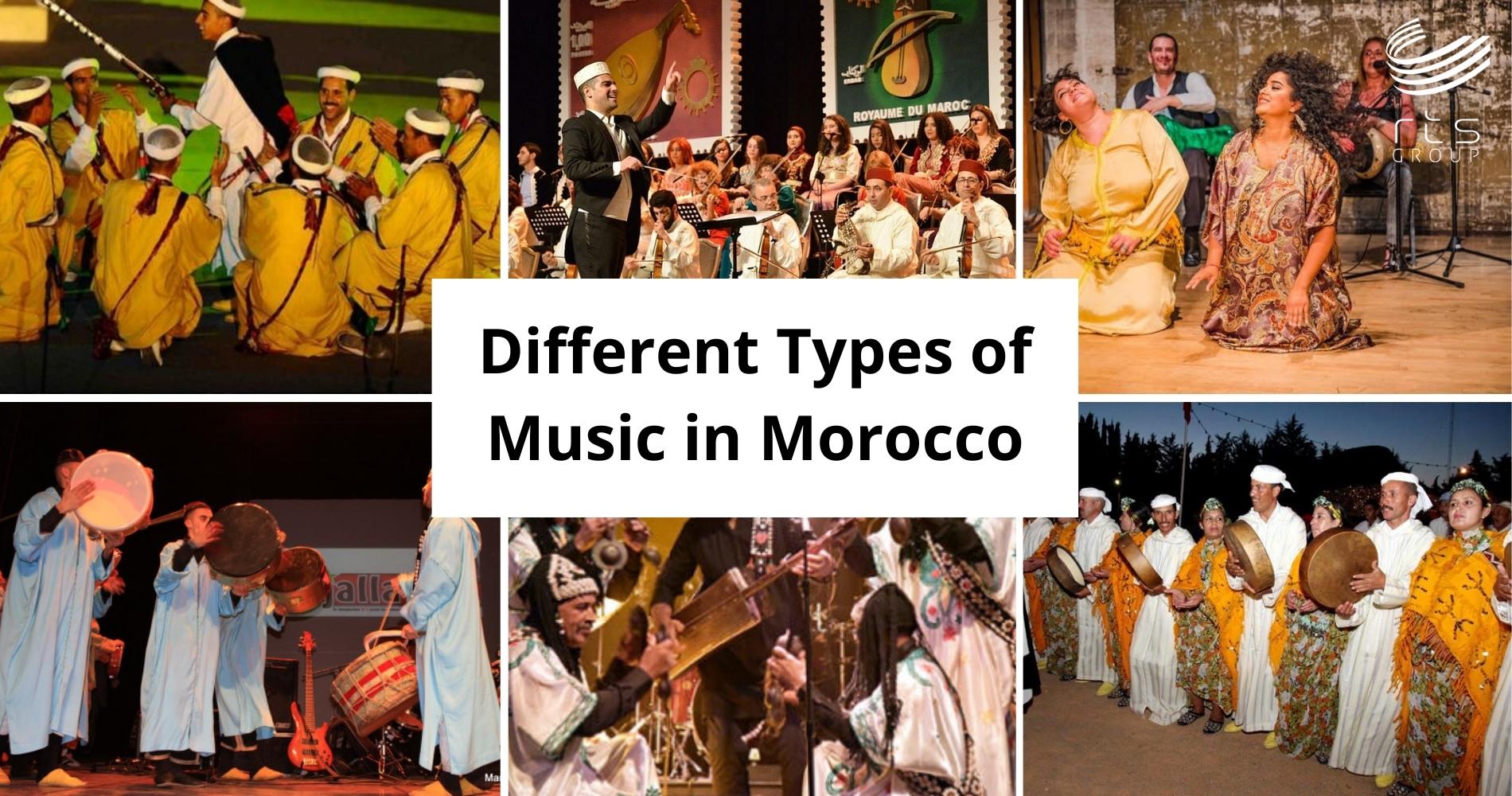
Different Types of Music in Morocco
There is no doubt that Moroccan music is every bit as magical as the country itself. There are several types of music in the area such as Amazigh music, Andalusian Classical Music,Reggada Music, Gnawa Music, Chaabi and Fusion, Dakka Marrakchia and among many other styles. Besides the way Moroccan music is written and performed, what makes it stand out from other music genres is the number of cultural influences that it embodies. With so many music influences, Moroccan music has a timeless quality that stays with you long after you hear it, and ingrains itself in your cultural subconscious.
- Amazigh Music
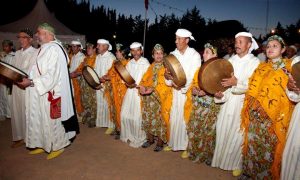 Early Moroccan music, also known as Amazigh folk music, is the folk music of the Amazigh (Berber) people. This music dates back well before the 12th century and it is known as one of the first inhabitants of the continent of Africa, the Amazigh live in the northwest corner of the continent and controlled the Saharan trade for a long time. It is important to understand that there are three types of Amazigh music, namely professional, village, and ritual. It is traditionally thought that when the whole Berber community gathers together for traditional Berber dancing and singing, they will sing and dance to the beat of a drum and flute while rhythmic hand clapping accompanies them.
Early Moroccan music, also known as Amazigh folk music, is the folk music of the Amazigh (Berber) people. This music dates back well before the 12th century and it is known as one of the first inhabitants of the continent of Africa, the Amazigh live in the northwest corner of the continent and controlled the Saharan trade for a long time. It is important to understand that there are three types of Amazigh music, namely professional, village, and ritual. It is traditionally thought that when the whole Berber community gathers together for traditional Berber dancing and singing, they will sing and dance to the beat of a drum and flute while rhythmic hand clapping accompanies them.
- Andalusian Classical Music
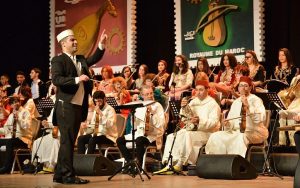 Andalusian music is a music genre that originated in North Africa. Andalusian music incorporates North African, Spanish, and Moorish influences, and consists of three musical styles: flamenco, a gypsy style of music and dance; The Andalusian music of Morocco is traditional, and is performed at Moroccan weddings and at Ramadan.
Andalusian music is a music genre that originated in North Africa. Andalusian music incorporates North African, Spanish, and Moorish influences, and consists of three musical styles: flamenco, a gypsy style of music and dance; The Andalusian music of Morocco is traditional, and is performed at Moroccan weddings and at Ramadan.
- Reggada Music
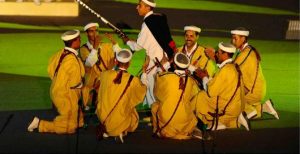 The Reggada is a musical style and a warrior dance from the great Berber tribal confederation of the Beni-Snassen in northeastern Morocco. It is found mainly in the provinces of Berkane and Oujda, but also in the provinces of Taourirt, Nador, Guercif, Taza, Al Hoceima. Outside the Beni-Snassen region and eastern Morocco in general, Reggada is very popular in the rest of Morocco, but also internationally thanks to the Moroccan diaspora.
The Reggada is a musical style and a warrior dance from the great Berber tribal confederation of the Beni-Snassen in northeastern Morocco. It is found mainly in the provinces of Berkane and Oujda, but also in the provinces of Taourirt, Nador, Guercif, Taza, Al Hoceima. Outside the Beni-Snassen region and eastern Morocco in general, Reggada is very popular in the rest of Morocco, but also internationally thanks to the Moroccan diaspora.
- Gnawa Music
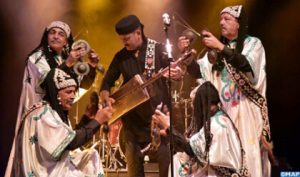 Gnawa is a type of music native to Morocco. This music originated in the 1920s but has its roots in traditional religious music. Gnawa dance music is percussion heavy and features traditional North African instruments such as the qraqeb, a large bass drum, and the krakeb, a spiked metal bracelet that is played on the knees. Gnawa music incorporates a lot of improvisation and is centered around the maalem, a revered religious teacher. There is an enchanting feel to this piece that is very captivating. They still retain the traditional sound that their ancestors were famous for, yet they have blended it with hip-hop, jazz, rock, and funk..
Gnawa is a type of music native to Morocco. This music originated in the 1920s but has its roots in traditional religious music. Gnawa dance music is percussion heavy and features traditional North African instruments such as the qraqeb, a large bass drum, and the krakeb, a spiked metal bracelet that is played on the knees. Gnawa music incorporates a lot of improvisation and is centered around the maalem, a revered religious teacher. There is an enchanting feel to this piece that is very captivating. They still retain the traditional sound that their ancestors were famous for, yet they have blended it with hip-hop, jazz, rock, and funk..
- Chaabi and Fusion
 Moroccan chaabi is a group of popular Arabic musical genres from Morocco. Chaabi music features simple melodies, and is sung in a variety of languages. Chaabi music is centered around the oud, a stringed instrument, and the darbuka, a drum. It is found in the predominantly Arabic-speaking Atlantic plains (Doukkala-Abda, Chaouia-Ouardigha, Gharb-Chrarda-Beni Hssen etc.) as well as in the Middle Atlas1. It is usually divided into chaabi-malhoun, close to Algerian chaabi, and modern chaâbi, or chaâbi-pop, which refers to the popular music in force since the 1980s in Morocco.
Moroccan chaabi is a group of popular Arabic musical genres from Morocco. Chaabi music features simple melodies, and is sung in a variety of languages. Chaabi music is centered around the oud, a stringed instrument, and the darbuka, a drum. It is found in the predominantly Arabic-speaking Atlantic plains (Doukkala-Abda, Chaouia-Ouardigha, Gharb-Chrarda-Beni Hssen etc.) as well as in the Middle Atlas1. It is usually divided into chaabi-malhoun, close to Algerian chaabi, and modern chaâbi, or chaâbi-pop, which refers to the popular music in force since the 1980s in Morocco.
- Dakka Marrakchia
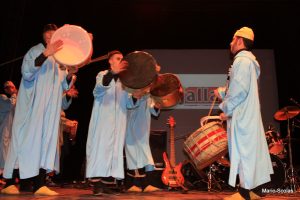 A typical folkloric musical rhythm of the Moroccan city of Marrakech, the dakka marrakchia consists of a musical art combining religious incantation and African trance, thus giving it a mystical character. Once at the heart of the Achoura Festival, this musical rhythm now animates family celebrations, weddings, baptisms and many other festivities.
A typical folkloric musical rhythm of the Moroccan city of Marrakech, the dakka marrakchia consists of a musical art combining religious incantation and African trance, thus giving it a mystical character. Once at the heart of the Achoura Festival, this musical rhythm now animates family celebrations, weddings, baptisms and many other festivities.
Arabic music is the music of the Arab world. Arabic music incorporates rhythmic and melodic elements, and is sung in colloquial Arabic. Even though Morocco is a relatively small country, it is rich in soul-enriching culture. The Moroccan people are known for their hospitality, and the country’s rich musical history is just one example of the many ways they welcome visitors. Whether you want to experience Moroccan music on a concert tour or at a private party, the Morocco Exchange can help you plan the perfect Moroccan music experience.
